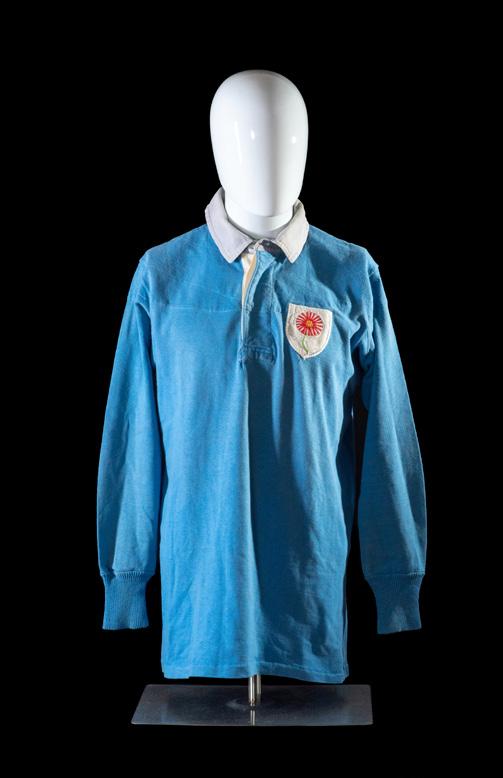
4 minute read
LOT 29 1973 New
Zealand-Barbarians | Sir Colin Meads
Rugby Union jersey match-worn by Sir Colin Meads
Advertisement
Jersey & Provenance
Red jersey with white collar in complete and original condition. Bears label for Canterbury, embroidered leaping lamb to red canvas outline badge applied to chest, white cotton No.5 to reverse. A few marks and small hole noted and ‘Barbarians 1’ inscribed to back of collar. Possibly faded as though it may have been used after the match, perhaps worn at the Meads’ farm.
Provenance: the personal collection of Sir Gareth Edwards CBE & family.
Sir Colin Meads
There is no figure more iconic in rugby union than Colin Meads (1936-2017), one of the finest rugby players ever seen. In 1999 Meads was named New Zealand rugby player of the (20th) century, a huge accolade in a country which breathes rugby union.
Meads made his test debut against Australia in 1957 and went on to play 133 All Blacks matches, including a then record 55 tests until his final appearance in 1971. These are remarkable statistics in an era when the All Blacks seldom played more than four tests a year. Colin Meads was inducted into the International Rugby Hall of Fame in its inaugural year, alongside Sir Gareth Edwards.
He was a sportsman who defined the spirit of New Zealand and embodied the best qualities of an All Black: he was tough, uncompromising, loyal, and humble. In a relatively young nation, he helped to define qualities which were seen to be essential to the New Zealand character.
Colin Earl Meads was a descendant of three generations of sheep farmers. He was born in Cambridge, in the Waikato region of New Zealand’s North Island. When he was 7, his parents moved to a hill farm in the rugged King Country, in the heart of the North Island. As a child, Meads contracted scarlet and rheumatic fevers, which left him so weakened that he was taught to knit lest his hands become deformed.
Nevertheless, the young Mead was hardened by farming life and developed great strength, stamina, and toughness. He played his entire club career for Waitete club and amassed 139 appearances for King Country province.
He played rugby with incredible skills for a large lock forward and was said to have revolutionised forward play by running the ball. More crucially he had enormous will to win that inspired his teammates. Yet he was uncomfortable with fame, describing himself as a ‘country hick in the big time’, he always saw himself as a father first, a farmer second and an All Black incidentally.
Meads was nicknamed “Pinetree” by teammate Kevin Briscoe during a Japan tour with the under-23 team in 1958. The sobriquet stayed with him for the rest of his life, epitomizing his strength, presence, and indomitability. In 1972, he broke his back in a car crash and his body was encased in plaster but incredibly he was back on the field within five months.
This was typical of a man who had played on with a broken arm against Eastern Transvaal in 1970, and a man who returned to the field against France in ’67, after being viciously kicked in the head as he lay on the ground.
Throughout his playing career, Meads was an almost permanent fixture in the All Blacks squad. He missed the first Test against the British and Irish Lions in 1959 but the following year he had an outstanding tour of South Africa. His try in the second Test clinched victory for the All Blacks and cemented his place for many years to come.
Meads played a major part in the tour to Britain and France in 1963 and helped to clock up series victories in 1965 and 1966 over the Springboks and the British Lions in 1967.
Colin Meads was the only player present for an All Blacks winning run of 17 matches. He captained the All Blacks eleven times including the inexperienced All Blacks team who lost the 1971 series to the British Lions - which remains New Zealand’s only defeat by the Lions. That series would mark the end of his long and illustrious 18-year rugby career.
He is still regarded as New Zealand’s finest All Black, even when players of the modern era such as Richie McCaw, who played 148 tests, surpassed Meads’ record for test appearances. After his retirement Colin Meads continued farming but also worked as an All Blacks selector and manager, mentoring generations of players to wear the famous black jersey. Former All Blacks captain and coach Brian Lochore said of Meads ‘Nobody has done more for New Zealand rugby, at any time in my view’.
Mervyn Davies, the Wales No 8 who played in the 1971 Lions series wrote of Meads,
‘No player encapsulates a nation’s attitude to sport like Colin Meads does for New Zealand.
In a land of rugby giants, he still reigns supreme and is regarded by many as the greatest ever All Black. He was the flag-bearer of New Zealand manhood’.
Meads succumbed to a long battle with cancer at the age of 81, but not before seeing his image immortalised in bronze in his hometown of Te Kuiti.
The Match
This jersey was Colin Meads’ New Zealand ‘Baa-Baas’ jersey for whom he was selected for only two matches in ‘73. It is likely that the jersey was retained for both matches therefore the only one of its kind.

The New Zealand Barbarian Rugby Club, founded in 1937, adopted the philosophies of free-flowing rugby synonymous with the original Barbarians Club in the UK.
Sir Gareth Recalls
‘What else is there to say about the great man? We became friends after many matches against each other and meeting after our playing days were over.
Colin was a colossus of a man in every sense, the type of player you would always want on your side’.
Estimate: £3000-5000










